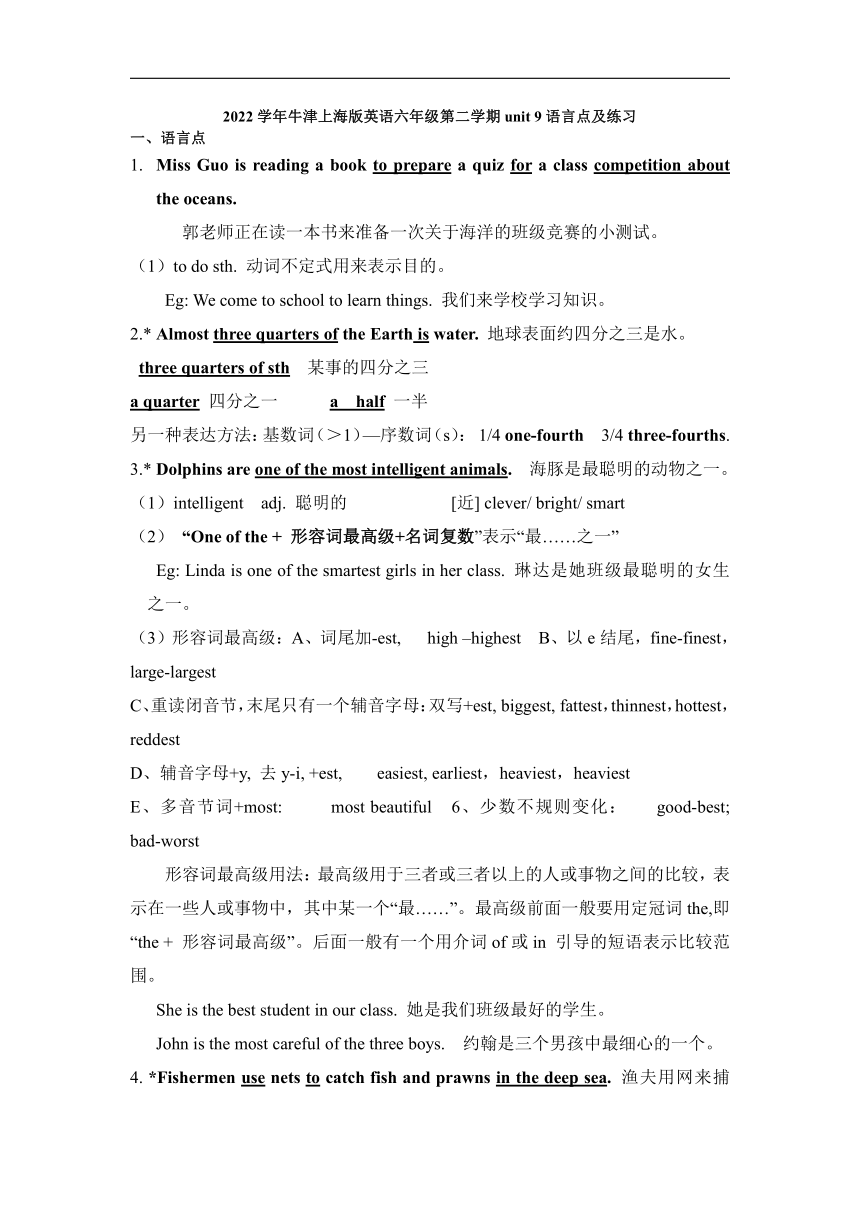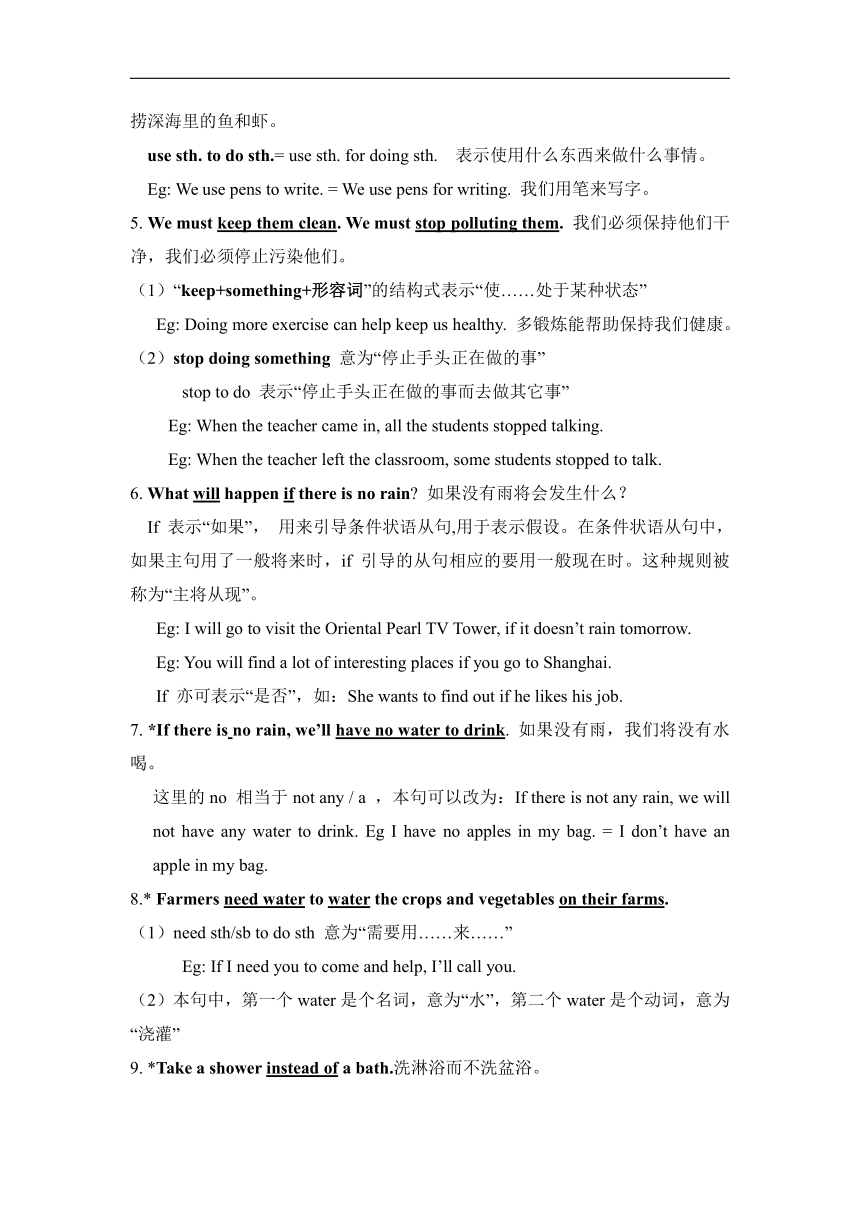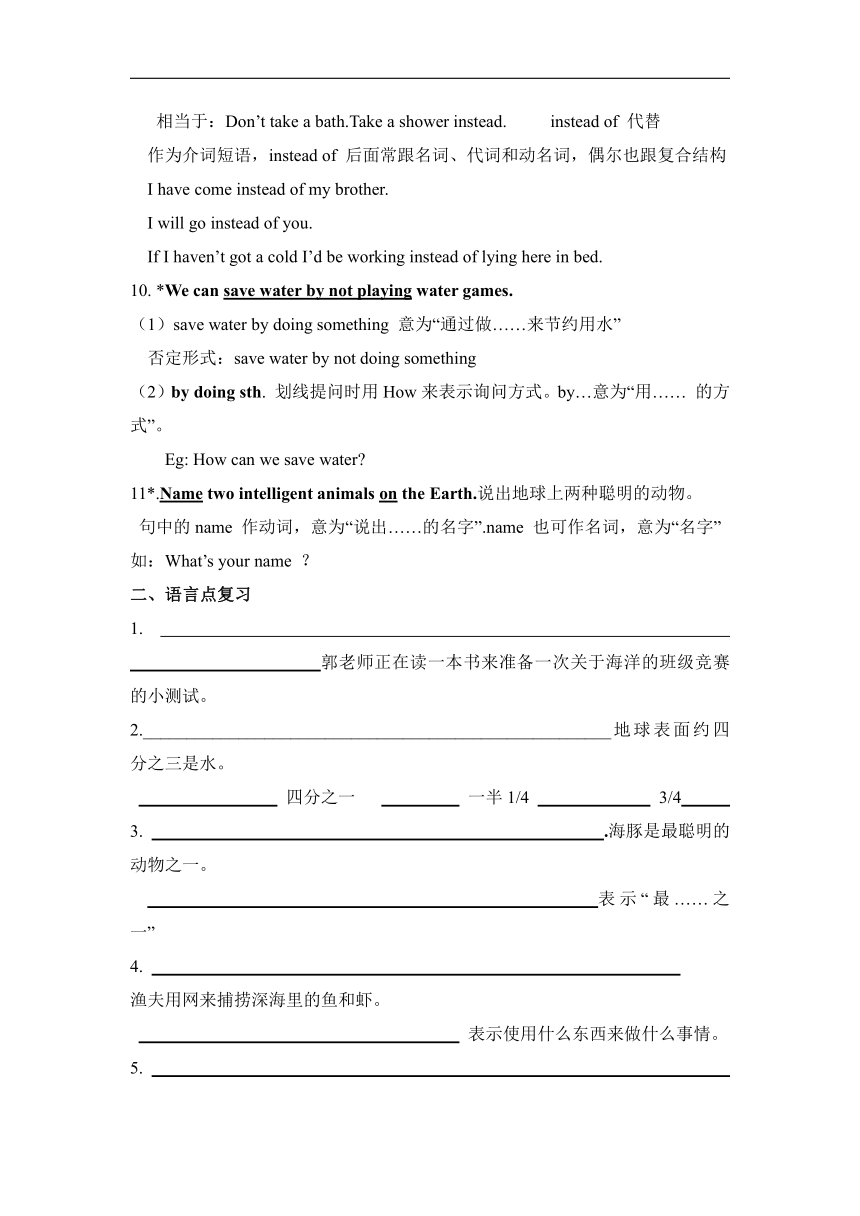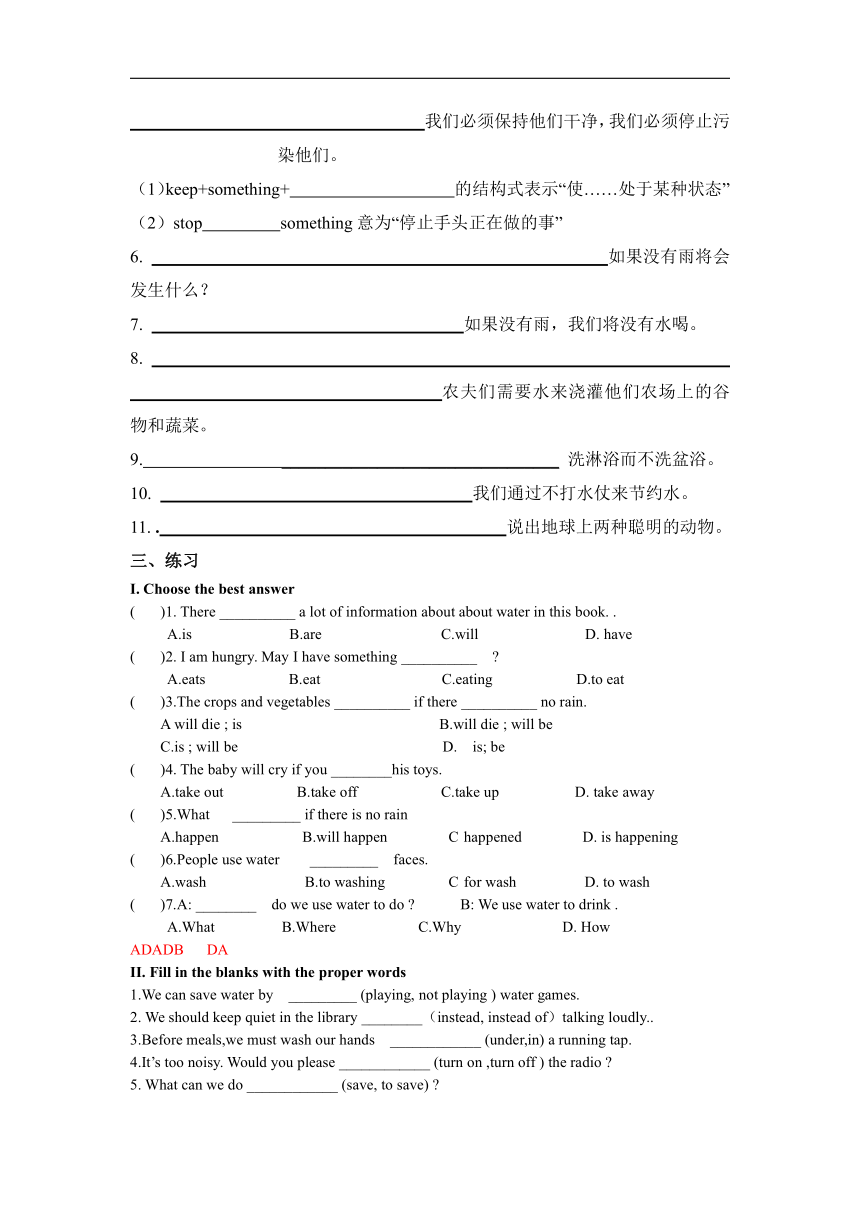牛津上海版英语六年级下册 Unit9 Sea water and rain water 语言点及练习(含答案)
文档属性
| 名称 | 牛津上海版英语六年级下册 Unit9 Sea water and rain water 语言点及练习(含答案) |

|
|
| 格式 | docx | ||
| 文件大小 | 28.6KB | ||
| 资源类型 | 教案 | ||
| 版本资源 | 牛津上海版(试用本) | ||
| 科目 | 英语 | ||
| 更新时间 | 2022-06-01 00:00:00 | ||
图片预览




文档简介
2022学年牛津上海版英语六年级第二学期unit 9语言点及练习
一、语言点
Miss Guo is reading a book to prepare a quiz for a class competition about the oceans.
郭老师正在读一本书来准备一次关于海洋的班级竞赛的小测试。
(1)to do sth. 动词不定式用来表示目的。
Eg: We come to school to learn things. 我们来学校学习知识。
2.* Almost three quarters of the Earth is water. 地球表面约四分之三是水。
three quarters of sth 某事的四分之三
a quarter 四分之一 a half 一半
另一种表达方法:基数词(>1)—序数词(s): 1/4 one-fourth 3/4 three-fourths.
3.* Dolphins are one of the most intelligent animals. 海豚是最聪明的动物之一。
(1)intelligent adj. 聪明的 [近] clever/ bright/ smart
(2) “One of the + 形容词最高级+名词复数”表示“最……之一”
Eg: Linda is one of the smartest girls in her class. 琳达是她班级最聪明的女生之一。
(3)形容词最高级:A、词尾加-est, high –highest B、以e结尾,fine-finest, large-largest
C、重读闭音节,末尾只有一个辅音字母:双写+est, biggest, fattest,thinnest,hottest,reddest
D、辅音字母+y, 去y-i, +est, easiest, earliest,heaviest,heaviest
E、多音节词+most: most beautiful 6、少数不规则变化: good-best; bad-worst
形容词最高级用法:最高级用于三者或三者以上的人或事物之间的比较,表示在一些人或事物中,其中某一个“最……”。最高级前面一般要用定冠词the,即“the + 形容词最高级”。后面一般有一个用介词of或in 引导的短语表示比较范围。
She is the best student in our class. 她是我们班级最好的学生。
John is the most careful of the three boys. 约翰是三个男孩中最细心的一个。
4. *Fishermen use nets to catch fish and prawns in the deep sea. 渔夫用网来捕捞深海里的鱼和虾。
use sth. to do sth.= use sth. for doing sth. 表示使用什么东西来做什么事情。
Eg: We use pens to write. = We use pens for writing. 我们用笔来写字。
5. We must keep them clean. We must stop polluting them. 我们必须保持他们干净,我们必须停止污染他们。
(1)“keep+something+形容词”的结构式表示“使……处于某种状态”
Eg: Doing more exercise can help keep us healthy. 多锻炼能帮助保持我们健康。
(2)stop doing something 意为“停止手头正在做的事”
stop to do 表示“停止手头正在做的事而去做其它事”
Eg: When the teacher came in, all the students stopped talking.
Eg: When the teacher left the classroom, some students stopped to talk.
6. What will happen if there is no rain 如果没有雨将会发生什么?
If 表示“如果”, 用来引导条件状语从句,用于表示假设。在条件状语从句中,如果主句用了一般将来时,if 引导的从句相应的要用一般现在时。这种规则被称为“主将从现”。
Eg: I will go to visit the Oriental Pearl TV Tower, if it doesn’t rain tomorrow.
Eg: You will find a lot of interesting places if you go to Shanghai.
If 亦可表示“是否”,如:She wants to find out if he likes his job.
7. *If there is no rain, we’ll have no water to drink. 如果没有雨,我们将没有水喝。
这里的no 相当于not any / a ,本句可以改为:If there is not any rain, we will not have any water to drink. Eg I have no apples in my bag. = I don’t have an apple in my bag.
8.* Farmers need water to water the crops and vegetables on their farms.
(1)need sth/sb to do sth 意为“需要用……来……”
Eg: If I need you to come and help, I’ll call you.
(2)本句中,第一个water是个名词,意为“水”,第二个water是个动词,意为“浇灌”
9. *Take a shower instead of a bath.洗淋浴而不洗盆浴。
相当于:Don’t take a bath.Take a shower instead. instead of 代替
作为介词短语,instead of 后面常跟名词、代词和动名词,偶尔也跟复合结构
I have come instead of my brother.
I will go instead of you.
If I haven’t got a cold I’d be working instead of lying here in bed.
10. *We can save water by not playing water games.
(1)save water by doing something 意为“通过做……来节约用水”
否定形式:save water by not doing something
(2)by doing sth. 划线提问时用How来表示询问方式。by…意为“用…… 的方式”。
Eg: How can we save water
11*.Name two intelligent animals on the Earth.说出地球上两种聪明的动物。
句中的name 作动词,意为“说出……的名字”.name 也可作名词,意为“名字”
如:What’s your name ?
二、语言点复习
1.
郭老师正在读一本书来准备一次关于海洋的班级竞赛的小测试。
2.______________________________________________________地球表面约四分之三是水。
四分之一 一半1/4 3/4
3. .海豚是最聪明的动物之一。
表示“最……之一”
4.
渔夫用网来捕捞深海里的鱼和虾。
表示使用什么东西来做什么事情。
5.
我们必须保持他们干净,我们必须停止污染他们。
(1)keep+something+ 的结构式表示“使……处于某种状态”
(2)stop something意为“停止手头正在做的事”
6. 如果没有雨将会发生什么?
7. 如果没有雨,我们将没有水喝。
8.
农夫们需要水来浇灌他们农场上的谷物和蔬菜。
9. ________________________________ 洗淋浴而不洗盆浴。
10. 我们通过不打水仗来节约水。
11. . 说出地球上两种聪明的动物。
三、练习
I. Choose the best answer
( )1. There __________ a lot of information about about water in this book. .
A.is B.are C.will D. have
( )2. I am hungry. May I have something __________
A.eats B.eat C.eating D.to eat
( )3.The crops and vegetables __________ if there __________ no rain.
A will die ; is B.will die ; will be
C.is ; will be D. is; be
( )4. The baby will cry if you ________his toys.
A.take out B.take off C.take up D. take away
( )5.What _________ if there is no rain
A.happen B.will happen C happened D. is happening
( )6.People use water _________ faces.
A.wash B.to washing C for wash D. to wash
( )7.A: ________ do we use water to do B: We use water to drink .
A.What B.Where C.Why D. How
ADADB DA
II. Fill in the blanks with the proper words
1.We can save water by _________ (playing, not playing ) water games.
2. We should keep quiet in the library ________(instead, instead of)talking loudly..
3.Before meals,we must wash our hands ____________ (under,in) a running tap.
4.It’s too noisy. Would you please ____________ (turn on ,turn off ) the radio
5. What can we do ____________ (save, to save)
6.Look,Uncle Li is good at ___________(fix,fixing)the dripping tap.
1.not playing 2.instead of 3.under 4.turn off 5.to save 6.fixing
plete the sentences with the given words in their proper forms.
1. I can answer all the questions ___________ . (correct)
2.Please don’t wash dishes under a ___________ . (run)tap.
3.Tom and Tim are two ___________ . (fish)
4. ___________ are growing vegetables. (farm)
5.English is one of ______________________________ subjects. (important)
6.Please help me to fix the ___________ tap. (drip)
7.The children are preparing for a ___________ about the oceans. (compete)
1.correctly 2.running 3.fishermen 4. Farmers 5.the most important 6.dripping 7.competition
IV. Rewrite the following sentences as required.
1..The crops will die if there is no water. (否定句)
The crops ________ _________ if there is no water.
2.John needs money to buy some books.. (否定句)
John ________ ________ money to buy any books.
3.We will go to Shanghai if it is fine tomorrow. (对划线部分提问)
_________ _________ you do if it is fine tomorrow
4.Judy uses a pen to write the letter. (对划线部分提问)
_________ does Judy use a pen to _________
5.They haven’t any brothers or sisters.(保持句意不变)
They_________ ________ brothers or sisters.
6.Firemen use water to put out fires.. .(保持句意不变)
Firemen use water _________ _________ out fires.
1.won’t die 2.doesn’t need 3.what will 4.what do 5.have no 6.for putting
V.Reading
(A)
I have always heard that walking under a ladder brings bad luck, but I have never thought so. I have walked under ladders many times, but I have never met anything bad before. It’s the same with black cats. People say if a black cat crosses before you, it means bad luck. I have never thought that until this afternoon. But ever since I heard my student Sam’s story, I have begun thinking about whether it was true.
This afternoon, Sam was walking down the street thinking about something, so he wasn’t paying attention to where he was going; he walked right under a ladder standing against a building. A black cat ran out of a door just at that moment, and Sam fell over it. His head hit the ladder. A man washing the window was at the top of that ladder and the dirty water went down through the air. Poor Sam! He got wet all over.
True or false.
( ) 1. At first, the writer believed that walking under a ladder would bring bad luck.
( ) 2. The writer has walked under ladders many times, and he has met something bad many times.
( ) 3. There was a man washing the window near the building.
( ) 4. The writer’s student, Sam had a bad luck that afternoon.
( ) 5. It’s really true that walking under a ladder or with black cats will bring bad luck to you.
F F T T F
(B)
Our eating habits are very important for good health. Many people like eating sweets and ice-cream more than meat and rice. Sweets and ice-cream are not bad for stomach if we eat them at the end of a meal. But if we eat them before a meal, they may take away our appetite. It is important for us to eat our meals at the same time every day. When we feel hungry, it is said that our body needs food. When we feel angry or excited, we may not want to eat.
A long time ago, in England, some judges used to decide whether a person was telling truth by giving him some dry bread. If the person could swallow the bread, it showed that he was telling the truth. Though this seems rather strange and foolish, it is indeed a way to find out the truth, sometimes. A person worrying about something has much difficulty in swallowing anything dry. Because he is worrying, he loses his appetite and does not want to eat.
Choose the right answer.
( ) 1. We must develop a good eating habit if we want to .
A. be angry B. eat more C. be hungry D. be healthy
( ) 2. It is good to eat sweets or ice-cream .
A. before a meal B. after a meal C. at any time D. during the day
( ) 3. We may not want to eat when .
A. we feel hungry B. we feel angry
C. the meal is ready D. we finish our work
( ) 4. When a person has nothing to worry about, he usually .
A. has a big appetite B. has a poor appetite
C. wants to drink C. wants to eat sweets
( ) 5. “Swallowing something” means .
A. eating and drinking B. eating something dry
C. eating something fast D. eating something slowly
D B B A C
(C)
An old man was walking in a street with his horse. It was raining hard. The old man was cold because he was walking in the rain. He wanted to go to a restaurant. It was a quarter past three in the afternoon. The old man got to a small restaurant. There were lots of people in it. The old man couldn't come near the fire. He thought and thought. At last he said to the waiters, "Take some fish to my horse." The waiter and the people were very surprised. The waiter said, "A horse doesn't eat fish." The old man told the waiter, "This horse is very interesting. It can sing, dance and do all kinds of things. It can eat fish, too," So the waiter brought the horse some fish.
All the people in the restaurant ran out to see the horse eat except the old man. Now the old man sat beside the fire. After a while the waiter came back and said, "Your horse didn't eat any fish." The old man said, "All right, take the fish back and put it on the table. I'll eat it."
Answer the following questions.
1. Why was the old man very cold
_______________________________________________________________
2. What time did he get to the small restaurant
_______________________________________________________________
3. Were there many people in the restaurant
_______________________________________________________________
4. Why did the old man tell the waiter to take some fish to his horse
_______________________________________________________________
5. Did the horse eat the fish or not
_______________________________________________________________
1. Because he was walking in the rain.
2. At 3:15 p.m. /At a quarter past three in the afternoon.
3. Yes.
4. Because he wanted to come near the fire.
5. It didn’t eat the fish.
一、语言点
Miss Guo is reading a book to prepare a quiz for a class competition about the oceans.
郭老师正在读一本书来准备一次关于海洋的班级竞赛的小测试。
(1)to do sth. 动词不定式用来表示目的。
Eg: We come to school to learn things. 我们来学校学习知识。
2.* Almost three quarters of the Earth is water. 地球表面约四分之三是水。
three quarters of sth 某事的四分之三
a quarter 四分之一 a half 一半
另一种表达方法:基数词(>1)—序数词(s): 1/4 one-fourth 3/4 three-fourths.
3.* Dolphins are one of the most intelligent animals. 海豚是最聪明的动物之一。
(1)intelligent adj. 聪明的 [近] clever/ bright/ smart
(2) “One of the + 形容词最高级+名词复数”表示“最……之一”
Eg: Linda is one of the smartest girls in her class. 琳达是她班级最聪明的女生之一。
(3)形容词最高级:A、词尾加-est, high –highest B、以e结尾,fine-finest, large-largest
C、重读闭音节,末尾只有一个辅音字母:双写+est, biggest, fattest,thinnest,hottest,reddest
D、辅音字母+y, 去y-i, +est, easiest, earliest,heaviest,heaviest
E、多音节词+most: most beautiful 6、少数不规则变化: good-best; bad-worst
形容词最高级用法:最高级用于三者或三者以上的人或事物之间的比较,表示在一些人或事物中,其中某一个“最……”。最高级前面一般要用定冠词the,即“the + 形容词最高级”。后面一般有一个用介词of或in 引导的短语表示比较范围。
She is the best student in our class. 她是我们班级最好的学生。
John is the most careful of the three boys. 约翰是三个男孩中最细心的一个。
4. *Fishermen use nets to catch fish and prawns in the deep sea. 渔夫用网来捕捞深海里的鱼和虾。
use sth. to do sth.= use sth. for doing sth. 表示使用什么东西来做什么事情。
Eg: We use pens to write. = We use pens for writing. 我们用笔来写字。
5. We must keep them clean. We must stop polluting them. 我们必须保持他们干净,我们必须停止污染他们。
(1)“keep+something+形容词”的结构式表示“使……处于某种状态”
Eg: Doing more exercise can help keep us healthy. 多锻炼能帮助保持我们健康。
(2)stop doing something 意为“停止手头正在做的事”
stop to do 表示“停止手头正在做的事而去做其它事”
Eg: When the teacher came in, all the students stopped talking.
Eg: When the teacher left the classroom, some students stopped to talk.
6. What will happen if there is no rain 如果没有雨将会发生什么?
If 表示“如果”, 用来引导条件状语从句,用于表示假设。在条件状语从句中,如果主句用了一般将来时,if 引导的从句相应的要用一般现在时。这种规则被称为“主将从现”。
Eg: I will go to visit the Oriental Pearl TV Tower, if it doesn’t rain tomorrow.
Eg: You will find a lot of interesting places if you go to Shanghai.
If 亦可表示“是否”,如:She wants to find out if he likes his job.
7. *If there is no rain, we’ll have no water to drink. 如果没有雨,我们将没有水喝。
这里的no 相当于not any / a ,本句可以改为:If there is not any rain, we will not have any water to drink. Eg I have no apples in my bag. = I don’t have an apple in my bag.
8.* Farmers need water to water the crops and vegetables on their farms.
(1)need sth/sb to do sth 意为“需要用……来……”
Eg: If I need you to come and help, I’ll call you.
(2)本句中,第一个water是个名词,意为“水”,第二个water是个动词,意为“浇灌”
9. *Take a shower instead of a bath.洗淋浴而不洗盆浴。
相当于:Don’t take a bath.Take a shower instead. instead of 代替
作为介词短语,instead of 后面常跟名词、代词和动名词,偶尔也跟复合结构
I have come instead of my brother.
I will go instead of you.
If I haven’t got a cold I’d be working instead of lying here in bed.
10. *We can save water by not playing water games.
(1)save water by doing something 意为“通过做……来节约用水”
否定形式:save water by not doing something
(2)by doing sth. 划线提问时用How来表示询问方式。by…意为“用…… 的方式”。
Eg: How can we save water
11*.Name two intelligent animals on the Earth.说出地球上两种聪明的动物。
句中的name 作动词,意为“说出……的名字”.name 也可作名词,意为“名字”
如:What’s your name ?
二、语言点复习
1.
郭老师正在读一本书来准备一次关于海洋的班级竞赛的小测试。
2.______________________________________________________地球表面约四分之三是水。
四分之一 一半1/4 3/4
3. .海豚是最聪明的动物之一。
表示“最……之一”
4.
渔夫用网来捕捞深海里的鱼和虾。
表示使用什么东西来做什么事情。
5.
我们必须保持他们干净,我们必须停止污染他们。
(1)keep+something+ 的结构式表示“使……处于某种状态”
(2)stop something意为“停止手头正在做的事”
6. 如果没有雨将会发生什么?
7. 如果没有雨,我们将没有水喝。
8.
农夫们需要水来浇灌他们农场上的谷物和蔬菜。
9. ________________________________ 洗淋浴而不洗盆浴。
10. 我们通过不打水仗来节约水。
11. . 说出地球上两种聪明的动物。
三、练习
I. Choose the best answer
( )1. There __________ a lot of information about about water in this book. .
A.is B.are C.will D. have
( )2. I am hungry. May I have something __________
A.eats B.eat C.eating D.to eat
( )3.The crops and vegetables __________ if there __________ no rain.
A will die ; is B.will die ; will be
C.is ; will be D. is; be
( )4. The baby will cry if you ________his toys.
A.take out B.take off C.take up D. take away
( )5.What _________ if there is no rain
A.happen B.will happen C happened D. is happening
( )6.People use water _________ faces.
A.wash B.to washing C for wash D. to wash
( )7.A: ________ do we use water to do B: We use water to drink .
A.What B.Where C.Why D. How
ADADB DA
II. Fill in the blanks with the proper words
1.We can save water by _________ (playing, not playing ) water games.
2. We should keep quiet in the library ________(instead, instead of)talking loudly..
3.Before meals,we must wash our hands ____________ (under,in) a running tap.
4.It’s too noisy. Would you please ____________ (turn on ,turn off ) the radio
5. What can we do ____________ (save, to save)
6.Look,Uncle Li is good at ___________(fix,fixing)the dripping tap.
1.not playing 2.instead of 3.under 4.turn off 5.to save 6.fixing
plete the sentences with the given words in their proper forms.
1. I can answer all the questions ___________ . (correct)
2.Please don’t wash dishes under a ___________ . (run)tap.
3.Tom and Tim are two ___________ . (fish)
4. ___________ are growing vegetables. (farm)
5.English is one of ______________________________ subjects. (important)
6.Please help me to fix the ___________ tap. (drip)
7.The children are preparing for a ___________ about the oceans. (compete)
1.correctly 2.running 3.fishermen 4. Farmers 5.the most important 6.dripping 7.competition
IV. Rewrite the following sentences as required.
1..The crops will die if there is no water. (否定句)
The crops ________ _________ if there is no water.
2.John needs money to buy some books.. (否定句)
John ________ ________ money to buy any books.
3.We will go to Shanghai if it is fine tomorrow. (对划线部分提问)
_________ _________ you do if it is fine tomorrow
4.Judy uses a pen to write the letter. (对划线部分提问)
_________ does Judy use a pen to _________
5.They haven’t any brothers or sisters.(保持句意不变)
They_________ ________ brothers or sisters.
6.Firemen use water to put out fires.. .(保持句意不变)
Firemen use water _________ _________ out fires.
1.won’t die 2.doesn’t need 3.what will 4.what do 5.have no 6.for putting
V.Reading
(A)
I have always heard that walking under a ladder brings bad luck, but I have never thought so. I have walked under ladders many times, but I have never met anything bad before. It’s the same with black cats. People say if a black cat crosses before you, it means bad luck. I have never thought that until this afternoon. But ever since I heard my student Sam’s story, I have begun thinking about whether it was true.
This afternoon, Sam was walking down the street thinking about something, so he wasn’t paying attention to where he was going; he walked right under a ladder standing against a building. A black cat ran out of a door just at that moment, and Sam fell over it. His head hit the ladder. A man washing the window was at the top of that ladder and the dirty water went down through the air. Poor Sam! He got wet all over.
True or false.
( ) 1. At first, the writer believed that walking under a ladder would bring bad luck.
( ) 2. The writer has walked under ladders many times, and he has met something bad many times.
( ) 3. There was a man washing the window near the building.
( ) 4. The writer’s student, Sam had a bad luck that afternoon.
( ) 5. It’s really true that walking under a ladder or with black cats will bring bad luck to you.
F F T T F
(B)
Our eating habits are very important for good health. Many people like eating sweets and ice-cream more than meat and rice. Sweets and ice-cream are not bad for stomach if we eat them at the end of a meal. But if we eat them before a meal, they may take away our appetite. It is important for us to eat our meals at the same time every day. When we feel hungry, it is said that our body needs food. When we feel angry or excited, we may not want to eat.
A long time ago, in England, some judges used to decide whether a person was telling truth by giving him some dry bread. If the person could swallow the bread, it showed that he was telling the truth. Though this seems rather strange and foolish, it is indeed a way to find out the truth, sometimes. A person worrying about something has much difficulty in swallowing anything dry. Because he is worrying, he loses his appetite and does not want to eat.
Choose the right answer.
( ) 1. We must develop a good eating habit if we want to .
A. be angry B. eat more C. be hungry D. be healthy
( ) 2. It is good to eat sweets or ice-cream .
A. before a meal B. after a meal C. at any time D. during the day
( ) 3. We may not want to eat when .
A. we feel hungry B. we feel angry
C. the meal is ready D. we finish our work
( ) 4. When a person has nothing to worry about, he usually .
A. has a big appetite B. has a poor appetite
C. wants to drink C. wants to eat sweets
( ) 5. “Swallowing something” means .
A. eating and drinking B. eating something dry
C. eating something fast D. eating something slowly
D B B A C
(C)
An old man was walking in a street with his horse. It was raining hard. The old man was cold because he was walking in the rain. He wanted to go to a restaurant. It was a quarter past three in the afternoon. The old man got to a small restaurant. There were lots of people in it. The old man couldn't come near the fire. He thought and thought. At last he said to the waiters, "Take some fish to my horse." The waiter and the people were very surprised. The waiter said, "A horse doesn't eat fish." The old man told the waiter, "This horse is very interesting. It can sing, dance and do all kinds of things. It can eat fish, too," So the waiter brought the horse some fish.
All the people in the restaurant ran out to see the horse eat except the old man. Now the old man sat beside the fire. After a while the waiter came back and said, "Your horse didn't eat any fish." The old man said, "All right, take the fish back and put it on the table. I'll eat it."
Answer the following questions.
1. Why was the old man very cold
_______________________________________________________________
2. What time did he get to the small restaurant
_______________________________________________________________
3. Were there many people in the restaurant
_______________________________________________________________
4. Why did the old man tell the waiter to take some fish to his horse
_______________________________________________________________
5. Did the horse eat the fish or not
_______________________________________________________________
1. Because he was walking in the rain.
2. At 3:15 p.m. /At a quarter past three in the afternoon.
3. Yes.
4. Because he wanted to come near the fire.
5. It didn’t eat the fish.
同课章节目录
- Module 1 City life
- Unit 1 Great cities in Asia
- Unit 2 At the airport
- Unit 3 Dragon Boat Festival
- Unit 4 Staying healthy
- Module 2 Changes
- Unit 5 What will I be like?
- Unit 6 Seasonal changes
- Unit 7 Travelling in Garden City
- Module 3 The nature world
- Unit 8 Windy weathe
- Unit 9 Sea water and rain wate
- Unit 10 Forests and land
- Unit 11 Controlling fire
